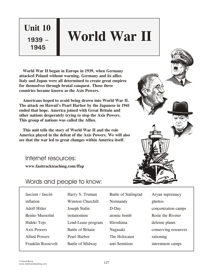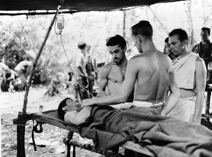| Unit 10:
World War II Frameworks for America's Past |
 |
| Unit 10:
World War II Frameworks for America's Past |
 |
 |
Click
on the links below -
|
||||||
Historical
photo sets |
1.
The causes of World War II 2. The Allied leaders and what they said 3. Major events / turning points of WWII 4. The Lend-Lease Program 5. The Holocaust 6. The home front 7. Race relations - African Americans, Japanese Americans 8. Famous American weapons of WWII |
||||||
| History
food feature |
Victory Gardens (Americans started millions of home gardens to grow food to help their families and the war effort.) | ||||||
| Exploring
further |
From
primary sources: FDR: America's Goals and Purpose in WWII The famous posters of the Four Freedoms are also shown. |
||||||
| Videos
and Internet sites  Students: Check with your parents for permission before visiting Internet links. |
Hitler rises in Germany
- segment from The Century: America's Time - Stormy Weather (2 of
3). Watch from 5:10 to 9:50. World War II begins - segment from The Century: America's Time - Over the Edge (3 of 3). Watch from 7:00 to 14:05 Battle of Britain - segment from The Century: America's Time - Civilians at War (1 of 3). Watch from 0:48 to 3:15. Japan attacks Pearl Harbor - segment from The Century: America's Time - Homefront (1 of 3). Watch from 0:45 to 3:40. Americans united for the war effort - segment from The Century: America's Time - Homefront (1 of 3). Watch from 4:51 to 14:17. The Battle of Midway - a short, four minute computer animated video from the History Channel. A brief account of this key battle in the Pacific, using actual film of the event, is here: Battle of Midway - WWII in Color. From D-Day to victory - segment from The Century: America's Time - Homefront (3 of 3). Watch from 0:28 to 14:05 Churchill declares Britain will fight (1940) (a re-enactment of part of the famous speech by British leader Winston Churchill. Poland, France, Holland, and many other countries of Europe had fallen, and Churchill knew that Britain would be attacked next.) The Lend-Lease program (a short clip from a film produced by the American government during WWII) Manpower (a short film produced by the American government during WWII. It explains how the government was encouraging more workers, including African Americans and women, to take jobs in factories and shipyards. Watch from 3:14 to the end.) Japanese relocation / internment camps (a short film made by the U.S. government to explain the relocation of Japanese Americans on the West Coast to internment camps during WWII) African American Colleges in War Time (a video from a film produced by the U.S. government during the war. It explains how historically black colleges - known as Negro Colleges at that time - responded to help the war effort) The Holocaust Memorial Museum (the web site for the museum in Washington, D.C.) |
||||||
| Consider also: |
America:
The Story of Us TV
mini-series, Episode 10, "WWII," has good video segments, including the
attack on Pearl Harbor, women in the war factories, D-Day, and the end
of the war.
This widely
praised production originally ran on the History Channel. Less
than $20 on Amazon for the 3 DVD set. Miracle at Midnight This movie is based on the inspiring true story of Danish citizens who organized to save their Jewish countrymen during the Holocaust. It's a classroom favorite that can spark lots of discussion. The running time is about 90 minutes. The National WWII Museum Collection of Artifacts A great online collection that can be used to make interesting classroom activities. Rosie the Riveter: Real Women Workers in World War II This YouTube video from the Library of Congress explores the origins of the iconic image of "Rosie." Lots of interesting facts and insights! What is an American? This famous speech by Harold Ickes in 1941 called on Americans to remember their values and to take action against the dictators. He declared that the conflict was not an ordinary war over territory, but "a desperate struggle for the possession of the souls of men." |
|
Copyright Notice
Copyright 2009, 2022 by David Burns. All rights reserved. As a guide to the Virginia Standards of Learning, some pages necessarily include phrases or sentences from that document, which is available online from the Virginia Department of Education. The author's copyright extends to the original text and graphics, unique design and layout, and related material. |